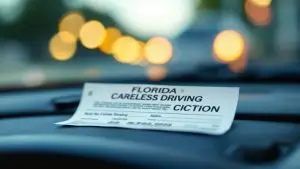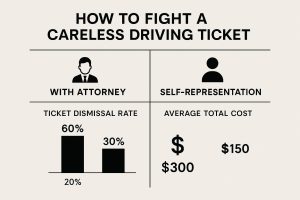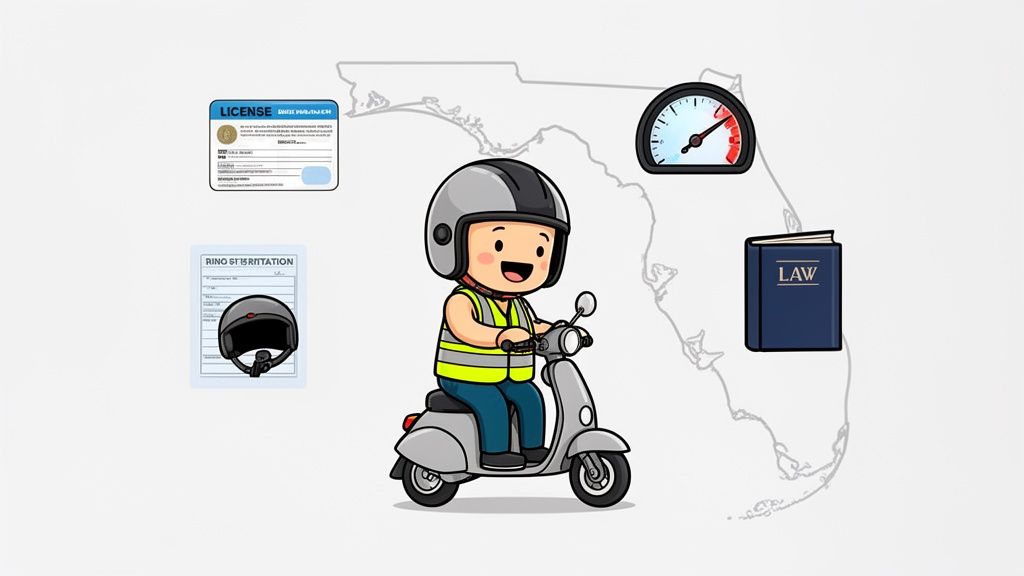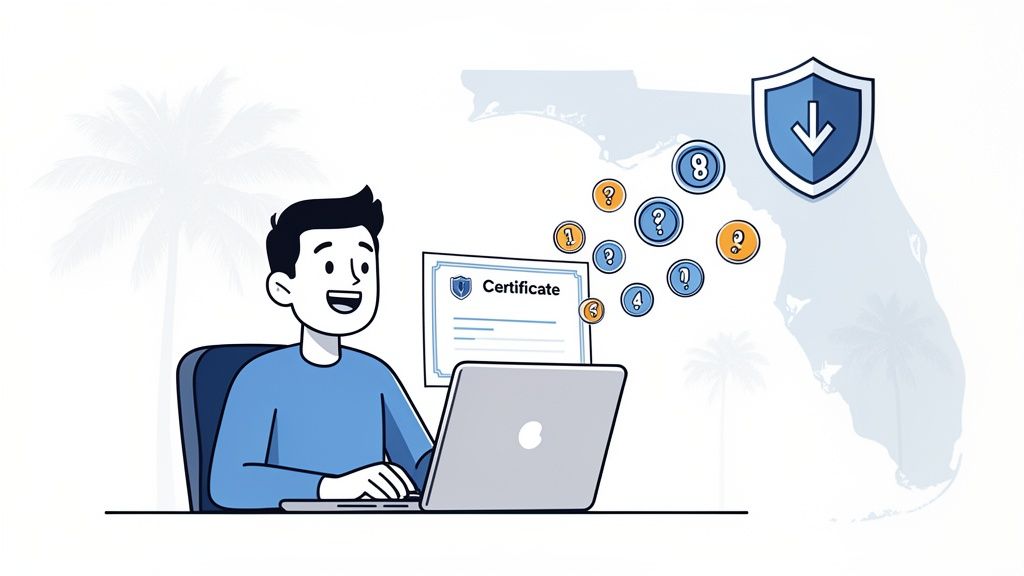Seeing flashing lights in your rearview mirror can be stressful. This is especially true when you get a careless driving ticket in Florida. It is a common ticket, but what does it mean for you?
Under Florida Statute 316.1925, this citation is a non-criminal moving violation. The law expects you to drive with care. You should drive like a “reasonably prudent person” would. A careless driving ticket happens when your driving could have endangered people or property. It is more than just a fine. It is a mark on your driving record that can lead to higher insurance rates.
What a Florida Careless Driving Ticket Really Means

When an officer gives you a careless driving ticket, they are not saying you meant to do wrong. Careless driving is different from reckless driving. Reckless driving involves ignoring safety on purpose. On the other hand, careless driving is usually about a temporary mistake or lack of focus. It often serves as a general violation for many small driving errors.
Although it is a non-criminal infraction, you should take it seriously. The ticket is tied to the idea of negligence. To better understand this, you can learn about the fundamentals of negligence law. The U.S. Department of Transportation (USDOT) provides extensive resources on national traffic safety laws, which can help put state rules into perspective.
Common Mistakes That Lead to a Ticket
So, what kind of driving gets one of these tickets? It is often for simple things we see every day. The law looks at whether your driving was careful for the specific situation.
Here are a few classic examples that an officer might cite:
- Following too closely, or tailgating, is a very common reason.
- Weaving between lanes without signaling properly.
- Driving too fast for the conditions—like in heavy rain, even if you are under the speed limit.
- Getting distracted by things like your GPS or coffee.
- Rolling through a stop sign because you were not paying attention.
Any action that is not what a cautious driver would do can result in a citation. These small mistakes cause many traffic incidents. In fact, Florida saw around 400,000 car collisions each year between 2018 and 2022. Many of those were caused by distracted driving, which is a key example of careless driving. The National Highway Traffic Safety Administration (NHTSA) offers detailed data on the dangers of distracted driving across the country.
The Immediate Consequences
Once you have the ticket, you will see the fine and violation code. You will also see instructions on how to respond. You have 30 days to decide what to do. The first impacts are on your wallet and your driving record. To learn how these infractions are classified, you can check this guide on https://bdischool.com/what-is-a-moving-violation.
To give you a clearer picture, let’s break down what you face.
Florida Careless Driving Ticket At a Glance
| Aspect | Details |
|---|---|
| Violation Type | Non-criminal moving violation |
| Response Deadline | 30 days from the date the ticket was issued |
| Fine Amount | Varies by county, but can be up to $500 |
| Points on License | 3 points for a standard violation |
| Points (if crash involved) | 4 points if the violation caused a collision |
| Insurance Impact | Almost always results in increased premiums |
As you can see, the consequences add up quickly.
The fine is one thing, but the points cause long-term problems. A standard careless driving ticket adds 3 points to your license. If your driving caused a collision, that jumps to 4 points.
Why do points matter so much? Your driving record is a report card for insurance companies. More points suggest you are more likely to be in a future collision. As a result, they will raise your rates. This is why figuring out your next steps is so important.
How Points and Insurance Rates Are Connected

That careless driving ticket you got in Florida is not just about a fine. It is also about the points added to your driving record. Those points are directly tied to your car insurance costs.
Think of your driving record like a report card. Points are bad grades. Insurance companies see those points and view you as a higher-risk driver. To them, more points mean you are more likely to have a collision they must pay for. Therefore, they increase your premiums to cover that extra risk. The Insurance Information Institute (IIHS) explains how violations impact insurance rates.
Understanding the Florida Point System
The Florida Department of Highway Safety and Motor Vehicles (FLHSMV) tracks every driver’s record. When you are found guilty of a moving violation, they add points. A standard careless driving ticket in Florida will add 3 points to your license.
But what if that careless driving led to a collision? The penalty is steeper, and you get 4 points. Those points can add up quickly. This can lead to much bigger problems than a rate hike. You can find official information on Florida’s point system at the Florida Highway Safety and Motor Vehicles (FLHSMV) website.
Florida has strict rules about points:
- Get 12 points in 12 months, and you face a 30-day suspension.
- Get 18 points in 18 months, and that becomes a 3-month suspension.
- Get 24 points in 36 months, and you are looking at a 1-year suspension.
The system is set up to flag risky drivers. It encourages them to change their habits before something serious happens.
The Financial Impact of a Single Ticket
Do not underestimate the financial impact of one ticket. Every insurance company has its own formula. However, a moving violation like careless driving will almost always make your premium go up. Also, it is not a one-time increase. You could pay higher rates for the next three to five years.
A small monthly increase might not seem like much. But over time, it can add up to hundreds or thousands of extra dollars. This long-term cost is usually much more than the original fine. If you are in this situation, it is worth looking into tips to reduce your insurance premiums.
The good news is that Florida gives you a way to keep points off your record. It all comes down to knowing how the system works. If you are curious about this, it helps to understand how points go away on your license and what that means for you.
Weighing Your Three Strategic Choices
Once a police officer gives you a careless driving ticket in Florida, the clock starts. You have a 30-day window to decide how to handle it. Your choice can affect your driving record and insurance for years.
Let’s walk through the three paths you can take. This will help you figure out which one is best for you.
Option 1: Pay the Fine and Accept the Consequences
The simplest path is to pay the fine. You can usually do this online or in person. It is quick and easy.
However, this convenience has a hidden cost. When you pay the fine, you plead guilty. This means the consequences are automatic.
- You get points, guaranteed. A careless driving ticket will add 3 points to your license. If it was related to a collision, that becomes 4 points.
- Your insurance rates will almost certainly go up. Insurers check your record. New points are a big red flag.
- The violation is now a permanent part of your driving history. This can be a problem later, especially if your job involves driving.
Paying the fine is the easy way out now. But it often becomes the most expensive option over time.
Option 2: Fight the Ticket in Court
If you believe you were not driving carelessly, you can plead “not guilty.” This means you go to court for a hearing. The officer must make their case, and you can present your side.
The best-case scenario? The judge dismisses the ticket. If that happens, you have no fine and no points. It is a clean slate.
Of course, there is a risk. If the judge sides with the officer, you will owe the fine plus court costs. You can go alone or hire a traffic attorney.

As you can see, a lawyer can improve your odds. But it is an upfront cost you must consider.
Option 3: Elect a Basic Driver Improvement Course
For many Florida drivers, this is the smartest move. If you are eligible, you can “elect” to take a state-approved Basic Driver Improvement (BDI) course. This is a strategic tool to protect your record.
By choosing this option, you stop the points from being added to your license.
The Biggest Perk: Under Florida law, when you complete a BDI course for a ticket, your insurance company cannot legally raise your rates because of that incident.
This is a huge protection the other options do not offer. The state encourages this for a reason. Statistics from organizations like the Governors Highway Safety Association (GHSA) show that driver education reduces collisions. For a deeper dive, check out this guide on Florida traffic ticket options.
Comparing Your Options for a Careless Driving Ticket
Feeling a bit overwhelmed? It is a big decision. This table breaks down the pros and cons of each path.
| Option | Impact on Points | Impact on Insurance | Effort Required |
|---|---|---|---|
| Pay the Fine | Guaranteed points added (3-4) | High likelihood of rate increase | Low |
| Fight in Court | Potential for no points (if you win) | Potential for no increase (if you win) | High (court appearance, possible attorney fees) |
| Take BDI Course | No points added to your record | Protected from a rate increase | Medium (course time and court fees) |
Ultimately, taking a driver improvement course is often the best way to protect your record. It is a small investment of time that pays for itself.
Your Step-by-Step Guide to Taking a Driver Improvement Course

If you have a careless driving ticket in Florida, taking a Basic Driver Improvement (BDI) course is almost always the best move. It is a clear path to keeping your driving record clean. It also stops your insurance from going up.
Think of a BDI course as a refresher on safe driving. It is a state-approved program. You must follow the steps exactly to get the benefits.
Step 1: Tell the Court You’re Taking the Course
First, you must notify the Clerk of Court in the county where you got the ticket. You cannot just sign up for a course on your own. You must officially “elect” to take it.
You only have 30 days from the date on the ticket to do this. When you notify the clerk, you will also pay the fine. This payment is separate from the cost of the actual BDI course.
Step 2: Find a State-Approved BDI Course
Next, it is time to find a course provider. This is a critical step. The course must be approved by the Florida Department of Highway Safety and Motor Vehicles (FLHSMV). The FLHSMV maintains a list of approved providers on its official website.
Most approved courses are only 4 hours long. They are also offered online. This lets you complete them from home on your own schedule. If you are looking for a convenient option, you can find a driver improvement course in Florida that works for you.
Step 3: Work Through the Course Material
The course itself covers topics to help you avoid another ticket. The lessons are practical and easy to follow.
You’ll learn about:
- Core Florida traffic laws and roadway rules.
- Defensive driving strategies for avoiding hazards.
- The real dangers of distracted driving.
- Smart ways to manage your speed and keep a safe distance.
It is worth paying attention. According to the National Highway Traffic Safety Administration (NHTSA), speeding was a factor in 29% of all traffic fatalities in 2021. The lessons you learn are meant to keep everyone safer.
Step 4: Turn in Your Certificate of Completion
After you pass the final quiz, you get a certificate of completion. This is the last and most important step. You must submit this certificate to the Clerk of Court.
Make sure you get it to them before the court’s deadline. This is usually 60 to 90 days from the day you elected the course. If you miss this deadline, it is like you never took the class. The points will go on your license.
Here’s the Payoff: By completing a BDI course, Florida law guarantees two major benefits. First, no points will be added to your driving record. Second, your auto insurance company cannot legally raise your rates because of that violation.
Those are huge protections. Taking a BDI course is your ticket to avoiding a financial hit.
What Does Careless Driving Actually Look Like on the Road?
The legal definition of “careless driving” can feel a bit unclear. It is a general violation that covers a lot of ground. Let’s talk about what a careless driving ticket in Florida really means in everyday driving.
You might be surprised that simple habits can lead to a citation. We are not always talking about reckless behavior. Sometimes, it is just a brief mistake that puts others at risk. Once you see these real-world examples, you can avoid them.
Driving Too Fast for Conditions
This is a big one. It is not just about breaking the speed limit.
For example, imagine you are driving on I-4 where the speed limit is 70 mph. Suddenly, a heavy Florida downpour starts. Visibility is poor, and the road is slick. Even if you are going 65 mph, an officer could give you a careless driving ticket. Why? Because a “careful and prudent” driver would have slowed down for the bad conditions. The Federal Highway Administration (FHWA) provides safety guidelines for driving in bad weather.
Following Too Closely and Making Bad Lane Changes
Aggressive or sloppy driving in traffic is another common reason for a ticket. Several bad habits fall into this category.
- Tailgating: Riding someone’s bumper is a classic example. It gives you no time to react if the car in front of you stops suddenly.
- Weaving through traffic: This is when a driver changes lanes quickly without signaling. It is a clear sign of careless driving.
- Cutting someone off: Moving into a lane so close that you force another driver to brake is a ticketable offense.
These actions make a normal commute a high-risk situation. One bad move can cause a chain-reaction collision.
Obvious (and Not-So-Obvious) Distractions
Distracted driving is a major cause of careless driving tickets. Texting is a well-known danger. However, many other actions can also get you into trouble.
Think about these moments behind the wheel:
- Eating or drinking: Juggling food takes your hands off the wheel and your mind off the road.
- Fiddling with the car’s controls: Spending too much time with the GPS, radio, or A/C is dangerous.
- Getting into a heated conversation: An intense argument can pull your focus from driving safely.
- Reaching for something: Looking away for just a second to grab your phone is all it takes to cause a collision.
These “minor” distractions are a major reason Florida sees over 400,000 collisions each year. The numbers are high in busy areas. For instance, Hillsborough County had over 29,000 collisions in 2021 alone. You can learn more about how these statistics impact Tampa drivers to see the local impact.
The Prudent Person Standard: An officer asks one question: “Was this person driving as a reasonably careful person would?” If the answer is no, you are probably getting a ticket.
As you can see, a careless driving ticket is for small mistakes that can have big consequences. By staying focused, you can keep yourself and other drivers safe.
Common Questions About Careless Driving Tickets
Getting a careless driving ticket can bring up many questions. You need clear answers quickly. Let’s cover some of the most common concerns Florida drivers have.
How Long Do I Have to Decide What to Do About My Ticket?
From the moment you get the ticket, a 30-day clock starts. This is a firm deadline. Within those 30 days, you must make a choice. You can pay the fine, fight the ticket, or sign up for a Basic Driver Improvement (BDI) course.
Doing nothing is the worst option. If you miss the deadline, you will face bigger problems. This can include extra fees and even a license suspension. It is very important to act fast.
Can I Still Take a BDI Course if My Ticket Was for Causing a Crash?
In most cases, yes. As long as the collision did not cause a fatality or serious injury, you can usually take a BDI course. This will keep the points off your record.
But the stakes are higher. A standard careless driving ticket is 3 points. If it involves a collision, that number jumps to 4 points. This makes the BDI course an even smarter choice. It helps you protect your driving record and avoid a higher insurance bill.
What Are the Limits on How Many Times I Can Take a Driver Improvement Course?
Florida has some rules about using traffic school. You can use a BDI course to dismiss points only five times in your life.
There is also a time limit. You can only take the course for a ticket once in any 12-month period. These rules ensure driver improvement is a real learning experience. It is not just a routine for repeat offenders. You should always check with the Clerk of Court to confirm you are eligible.
Does a BDI Course Make My Ticket Disappear Completely?
This is a common point of confusion. Taking a BDI course does not erase the ticket from your driving record. The citation will still be there. However, the record will show “adjudication withheld.”
The Key Difference: “Adjudication withheld” means “you were not officially convicted.” Because there is no conviction, no points go on your license. Also, Florida law stops your insurance company from raising your rates because of that ticket.
So while the ticket does not vanish, the course removes its power. It neutralizes the two biggest problems—the points and the insurance hike. This is why it is such a powerful tool for any driver with a careless driving ticket in Florida.
Ready to protect your driving record and keep your insurance rates down? Take a convenient, state-approved online Basic Driver Improvement course that meets all Florida requirements.





